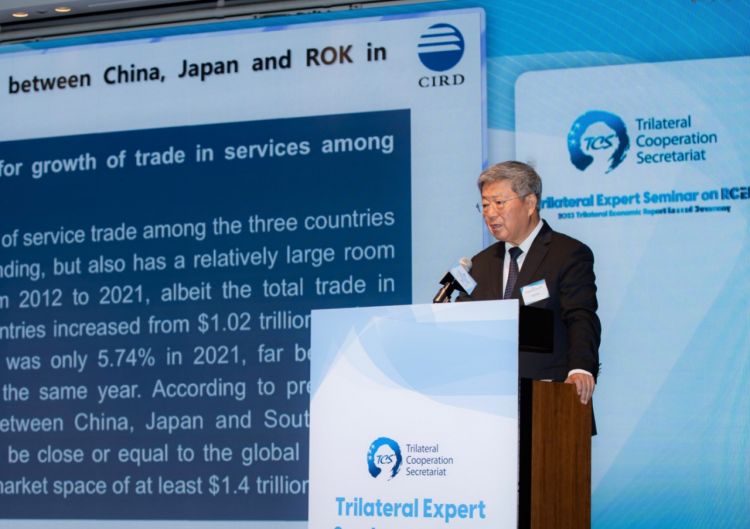The Trilateral Expert Seminar & 2023 Trilateral Economic Report Launch on RCEP Held in Seoul
On 22 June 2023, the Trilateral Expert Seminar and 2023 Trilateral Economic Report Launch with the theme of ‘Trilateral Economic Cooperation under the RCEP Framework: from Present to Future’ took place in Seoul, Republic of Korea. The event was held by the Trilateral Cooperation Secretariat (TCS) with support from China Institute for Reform and Development, Economic Research Institute for ASEAN and East Asia, and Korea Institute for International Economic Policy. Prof. Chi Fulin and Ms. Yang Rui attended the event upon invitation, along with experts and scholars as well as media representatives from China, Japan, the ROK and ASEAN states.
Secretary-General OU Boqian highlighted in the opening remarks that RCEP and its cumulative rules of origin have yielded significant benefits to member countries in terms of trade and supply chains. However, challenges such as geopolitical interference in economic activities and structural competition in manufacturing also exist. She emphasized the importance of China, Japan, and Republic of Korea optimizing the regional division of industries and enhancing cooperation in emerging economic sectors, including the digital economy, green economy, blue economy, cross-border e-commerce, and recreational industry.
President Chi Fulin emphasized in the keynote speech that RCEP has provided important conditions for deepening CJK economic and trade cooperation. At the same time, the trilateral economic and trade cooperation is also facing severe challenges. Thus, the key to deepening CJK economic and trade cooperation under the RCEP framework lies in rationally responding to the impact of "decoupling and chain breaking moves" by countries outside the region on regional supply chains and promoting mutual market opening. Firstly, the growing complementarity of service trade between these countries has made it a focal point for promoting economic and trade cooperation. Secondly, the key to enhancing service trade cooperation under the RCEP framework lies in market opening, while avoiding "decoupling and breaking the chain" and encouraging greater market access. Thirdly, as regional economic powerhouses, China, Japan, and ROK have a crucial role as facilitators in the RCEP process and are well-positioned to lead in implementing “fully cumulative” rules of origin. President Chi emphasized the need to grasp the prevailing trends, eliminate hindrances, resume CJK FTA negotiations, and jointly strive to establish the world’s largest high-level free trade area.
Mr. Aladdin D.Rillo, Senior Economic Advisor of Economic Research Institute for ASEAN and East Asia pointed out in his keynote speech that the rules-based multilateral trading system has benefited the global economy. The implementation of RCEP aims to strengthen regional economic cooperation, promote the development of regional industrial and value chains, and facilitate regional integration, but it faces multiple challenges in the implementation process. ASEAN, China, Japan and the ROK should enhance cooperation to improve regional trade connectivity and bolster supply chain resilience. Deepening trilateral cooperation within the RCEP framework is crucial for promoting the high-quality implementation of RCEP, and East Asia needs to deepen integration so as to achieve the important goal of global economic integration.
President Kim Heungchong highlighted that RCEP will contribute to stabilizing regional supply chain and bring member countries together as a united economic community. Global uncertainties should be addressed through free trade and multilateralism to achieve the well-being of people in the region. And the economies of the three countries should develop more closely, which will serve a catalyzing role for a higher level of free trade.
At the three sessions followed the Opening ceremony, participants exchanged ideas on themes including “Regional Economic Performance and Integration in the Post-pandemic Era”, “Regional Comprehensive Economic Partnership: Implication, Challenges, and Future Growth of East Asia and ASEAN” and “Regional Economic Cooperation under the RCEP Framework”. The second session was moderated by Ms. Yang Rui, Vice President of the China Institute for Reform and Development. 
 中改院
中改院
 Scan official wechat
Scan official wechat Scan official wechat
Scan official wechat